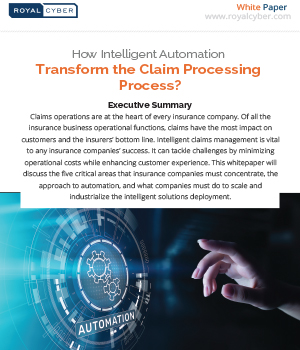
Insurance companies are under tremendous pressure to do everything faster and more effectively. They need to think of smarter ways to embed intelligence in their business functions. Intelligent solutions drive better performance, improve operational efficiency, and streamline processes—back-office and customer-facing.
Out of all the insurance business functions, claims have the most impact on the insurers’ bottom line. That is why claims automation is the future of insurance. The insurer needs to holistically embrace intelligent claim processing solutions to deliver fast, measurable bottom-line results.
Most of the claims processes—first notice of loss (FNOL), intelligent case management, frontline and back-office processes, prediction claims analytics, claims segmentation, claims indexing and routing, digital integration of claims systems—are labor-intensive and manually driven. To improve customer experience and handle cost pressures, insurers must identify and prioritize automation candidates. After identifying RPA use cases in the insurance company, insurers must invest in other technologies such as Artificial Intelligence (AI) and Machine Learning (ML) to analyze unstructured financial data. The intelligence gained from implementing these technologies can enable the company to completely reinvent claims business processes, employee engagement, and customer experiences.
This whitepaper will explore how companies can identify and prioritize candidate claims processes and what approach they should follow to perform automation.